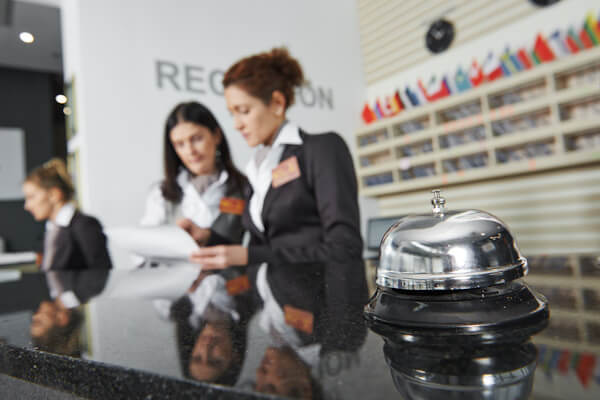Millennial Travelers: 7 Critical Ways Hotels Must Adapt
Millennial travelers have been a hot topic in the news this year. While they are like other generations in many ways, there are strong differences in what they want and need as travelers and hotel guests. And, given that Bazaarvoice predicts that by 2017, Millennials will have more spending power than any other generation, it is crucial for hoteliers to adapt to these differences.
Hoteliers need new, effective ways to engage with this new generation of travelers. We’ve analyzed all the research for you, and identified seven critical ways hotels must adapt, in order to meet the needs of Millennial travelers.
1. Increase Mobile Access
Millennial travelers are comfortable with making requests and interacting digitally, rather than speaking to a live person or making a phone call. In fact, they prefer it. A Nielsen survey found that Millennials have a more positive view of how technology is affecting their lives than any other generation. More than 74 percent feel that new technology makes their lives easier.
This preference becomes important at key touch points like checking in or making a service request. Physically waiting in line to check in or having to attract a waiter’s attention poolside is old fashioned to this crew.
Already, there’s a better way. There are mobile or web-based service apps that let guests order up more towels or get a restaurant recommendation in real time instead of having to go downstairs or talk on the phone.
Marriott’s mobile app lets guests to check-in prior to arrival and lets them opt in to receive alerts when their rooms are ready. For Millennials, getting off the plane at noon and receiving a text that the room is ready for check-in would be a huge source of delight.
Ritz-Carlton released a mobile app that provides mobile ordering at poolside or for room service, as well as app-based service requests. It may seem odd that an old-school, luxury hotel brand that is known for excellent service would let guests replace the personal touch with a touchscreen, but ask any Millennial how often he or she talks on the phone. You’ll likely hear, “Only when my parents call me.”
The Millennial preference for machine over human also extends to complaints. These consumers are more likely to go online to complain about issues with a hotel than they are to seek out a staffer to ask for a solution. A full 77% of hotel Twitter accounts and 45% of hotel Facebook accounts receive customer service-related posts, according to a report by L2. And, online review sites are only becoming more popular. So, it’s crucial for hoteliers to meet mobile with mobile by interacting with Millennials on their chosen communication channels. A mobile solution that aggregates all online mentions onto one accessible dashboard can make it easy for hoteliers to monitor online reviews and social media to resolve problems before guests leave.
2. Be Generous with Wi-fi
Gallup’s 2014 Hospitality Industry Study found that reliable internet access and problem resolution were the key criteria in repeat bookings for Millennials, while Generation X valued the hotel staff’s ability to resolve problems and service reliability. Conversely, Baby Boomers and Traditionalists–the oldest generation–valued responsive employees and problem resolution.
But, while wi-fi isn’t necessarily a top priority for every generation, there’s no generational difference in that everyone wants good, free wi-fi. It was most-desired amenity overall in a recent Hotels.com survey. A 2014 Revinate study also found that poor wi-fi can actually keep your hotel from receiving 5 star reviews.
3. For Millennial Travelers, Enable Spontaneity
In addition to high wi-fi expectations, a side effect of advancing mobile technology is an increasing demand for same-day room reservations via local sales channels, according to EY Global Hospitality Insights 2014. Even meta-OTAs like Expedia and Orbits now have “available tonight” sections, adding to the rise in newer mobile-first sites like HotelTonight and Jetsetter catering to younger travelers. Hoteliers can also take advantage of the Millennial tendency to book last-minute offers by including upgrade possibilities with their advanced check-ins.
4. Pump Up the Lounge Space
The defining characteristics of Millennial travelers aren’t solely digital. While they might not always want to talk face-to-face, Millennials enjoy spending time in public spaces. An E&Y report observes, “Although Millennials place less importance on face-to-face contact than prior generations, they have a strong desire to be actively social, including via telecommunication and social media. This hybrid of simultaneous social interaction in both physical space (sharing) and virtual space (communication) describes a phenomenon of isolated togetherness.”
In other words, although Millennials may appear to be engrossed in the digital world on their smartphones, they do enjoy spending time with others, and may wish to spend very little time in their guest rooms. To rise to this occasion, many hotels have expanded their lounge and lobby areas to include more seating, social, and casual dining while working lounges.
PentaHotels is a great example of a hotel brand that appeals to Millennials. It promotes its pentalounge – a combined lobby, reception, bar and café – as a “lifestyle lobby.” Each pentalounge is designed as a lively gathering place for hotel guests and locals. I stayed at a PentaHotel in Hong Kong recently and was amazed by the amount of different public spaces that were available: a game room and a library, in addition to multiple lounges and restaurants. The guest room itself was lovely, but I only needed it for sleeping and showering.
5. Give Back
Unlike the sometimes cynical Gen X’ers, Millennials genuinely believe they can influence change. “More than 85 percent of Millennials correlate their purchasing decisions and their willingness to recommend a brand to the social good efforts a company is making,” according to Entrepreneur Magazine. “Businesses interested in selling to Millennials can’t afford to ignore the opportunity to create social good.” The success of companies like TOMS shoes, which gives a pair of shoes to a child in need for every pair of shoes it sells, is a testament to value in catering to this Millennial behavior.
So how can hoteliers take advantage of this Millennial theme? Be as specific as possible about your corporate social responsibility endeavors. If possible, tie them directly to the guest experience.
For example, Kimpton Hotels & Restaurants partners with Dress for Success, which provides professional clothing, training, and job-hunting support to disadvantaged women. When Kimpton guests use the code DFS when booking, $10 of the daily room rate goes to Dress for Success. Guests also receive a 15% discount.
6. Cultivate your Local Relationships
Millennials have been exposed to more information about other cultures and had easier access to affordable travel than any American generation before them. With social media and free communications platforms like Skype and GChat, Millennials make friends and interact with people all over the world. They are comfortable with and even drawn to meeting new people and experiencing new cultures.
A Deloitte survey found that two thirds of Millennials prefer unique and authentic experiences to hygienic ones. Additionally a Skift study found that Millennials are more likely to participate in sharing economy services like AirBnB and Uber than other generations.
In response to this desire to experience the true local gems, hotels should do everything to appeal to the Millennial desire for authenticity. For example, Amansala in Tulum, Mexico showcases the preparation of local cuisine. And, some Kimpton hotels offer guided running tours, sharing local knowledge about the area.
7. Personalize, Personalize, Personalize
Finally, an increasing number of guests, especially Millennials, expect personalized hotel experiences. According to Deloitte’s Winning the Race for Guest Loyalty study, two-thirds of Millennial high-frequency travelers rated “unique rewards” as an important factor when choosing a hotel loyalty program, compared with 43 percent of their older counterparts. Deloitte found that instead of points, Millennials highly valued soft benefits like VIP treatments and exclusive experiences.
So, how can hoteliers take advantage of surprise and delight opportunities for Millennials? Hotels can access public profile information to collect information about their guests. Personal likes and interests can be used to create a personalized, memorable experience.
For example, a San Francisco Giants fan in town during a televised game would be floored if she opened her door after a long day of meetings to find two beers and a bag of peanuts, along with a note from the GM wishing the Giants luck tonight. You can be sure that she would share a photo of of the amenity on Facebook and Instagram, and tweet about the experience as well.
For your hotel, responding to Millennial culture may represent a bit of a shift in the way you’ve always handled marketing and guest relations. But remember, we’re not just talking about Millennials. Many of these ideas will resonate with Gen-Xers and Baby Boomers as well. Everyone is digital now, even if they’re not part of the soon-to-be Millennial majority.
Want to drive more direct revenue and connect with guests? Download our free Email Marketing Strategy Guide. Never before has there been a more jam-packed, industry-specific guide to help hoteliers master the art (and science) of email marketing. Over 40+ topics with actionable insights, strategies, and best practices for email marketing.
Related Posts

Insights that drive results
Subscribe now to get the latest content
This site is protected by reCAPTCHA and the Google Privacy Policy and Terms of Service apply. *Required fields.



